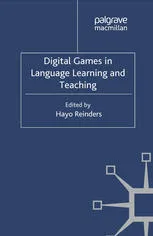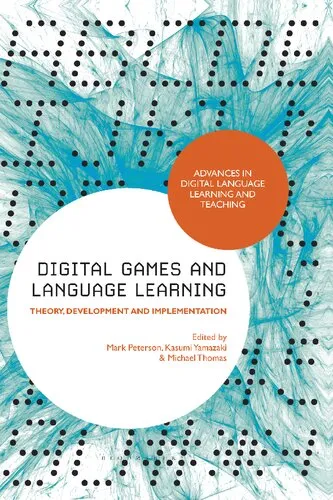Digital Games in Language Learning and Teaching
4.0
بر اساس نظر کاربران

شما میتونید سوالاتتون در باره کتاب رو از هوش مصنوعیش بعد از ورود بپرسید
هر دانلود یا پرسش از هوش مصنوعی 2 امتیاز لازم دارد، برای بدست آوردن امتیاز رایگان، به صفحه ی راهنمای امتیازات سر بزنید و یک سری کار ارزشمند انجام بدینکتاب های مرتبط:
معرفی جامع کتاب "Digital Games in Language Learning and Teaching"
کتاب Digital Games in Language Learning and Teaching یکی از آثار پیشگام در حوزه آموزش زبان به کمک تکنولوژی و بازیهای دیجیتال است. این کتاب، که توسط هایو ریندرز (Hayo Reinders) تدوین شده است، به بررسی نقش بازیهای دیجیتال در بهبود فرآیند یادگیری زبان میپردازد. استفاده از بازی بهعنوان یک ابزار آموزشی خلاقانه، انقلابی جدید در زمینه تدریس زبان خارجی به شمار میآید.
خلاصه کتاب
کتاب Digital Games in Language Learning and Teaching در چندین فصل به تشریح کاربردهای مختلف بازیهای دیجیتال در آموزش زبان میپردازد. این اثر با نگاهی پژوهشی و علمی، نمونهها و مطالعات موردی متعددی را ارائه میدهد که نشاندهنده تأثیر مثبت بازیهای دیجیتال در یادگیری زبانهای مختلف است. نویسنده ابتدا به مزایای استفاده از بازیهای دیجیتال میپردازد، از جمله ایجاد محیط تعاملی، انگیزش زبانآموزان، و تبدیل یادگیری به یک فرآیند سرگرمکننده و مشارکتی. سپس به شرح چالشها و موانع موجود در اجرای این مدل نوآورانه پرداخته و راهکارهایی ارائه میدهد که میتوانند در تدریس موثر باشند. این کتاب همچنین به تفاوتهای فرهنگی و چگونگی انطباق بازیها با نیازهای زبانآموزان با فرهنگها و زمینههای مختلف میپردازد.
نکات کلیدی
- بازیهای دیجیتال میتوانند بهعنوان ابزارهایی مکمل در کنار روشهای مرسوم تدریس زبان مورد استفاده قرار گیرند.
- ایجاد تعامل در محیط بازی باعث یادگیری عمیقتر زبانآموزان میشود.
- بازیهای دیجیتال میتوانند زمینههای یادگیری طبیعی مانند مکالمهها و تمرینهای واقعی زندگی را شبیهسازی کنند.
- استفاده موثر از بازیهای دیجیتال نیازمند برنامهریزی دقیق و آگاهی از نیازها و اهداف زبانآموزان است.
- با وجود مزایای بسیار، باید به چالشهای احتمالی، از جمله مشکلات فنی یا نبود زیرساختها، توجه کرد.
نقلقولهای معروف از کتاب
“Learning through play is not a new concept, but digital games have brought this idea into the 21st century in ways we never imagined.”
“Games are not just fun; they are powerful tools for language acquisition and engagement.”
چرا این کتاب اهمیت دارد؟
با پیشرفت تکنولوژی و نفوذ گسترده آن در آموزش، نقش بازیهای دیجیتال بهعنوان ابزاری انعطافپذیر و موثر در یادگیری زبان هر روز پررنگتر میشود. این کتاب نهتنها نشاندهنده ارزش علمی و عملی بازیهای دیجیتال است، بلکه مسیر روشنی برای معلمان، طراحان آموزشی، و پژوهشگران فراهم میکند. خواندن این کتاب برای هر کسی که به دنبال یافتن راهحلهای نوآورانه برای یادگیری زبان است، ضروری است. علاوه بر این، این کتاب به افراد کمک میکند که نگاه تازهای به بازیهای دیجیتال داشته باشند و آنها را نه تنها بهعنوان منبع سرگرمی، بلکه ابزاری الهامبخش برای تغییر سیستمهای آموزشی تجسم کنند.
این کتاب منبعی ارزشمند برای هر کسی است که به دنبال تحول در روشهای آموزشی و کشف شیوههای نوین برای تدریس زبان است.
Introduction to 'Digital Games in Language Learning and Teaching'
The integration of digital games into education has sparked innovative and engaging learning opportunities in various disciplines, particularly in language learning and teaching. My book, 'Digital Games in Language Learning and Teaching', delves into this exciting intersection of technology, pedagogy, and language acquisition, presenting a diverse landscape of theoretical insights, practical applications, and research findings. Designed for educators, researchers, and game enthusiasts alike, this volume explores how digital gaming can foster meaningful language learning experiences, while addressing challenges and best practices for implementation.
Detailed Summary of the Book
This book is a compilation of expert perspectives and research that examines how digital games can contribute to language learning and teaching. The text begins by establishing the foundation of games as instructional tools and how their interactive nature aligns with principles of second language acquisition (SLA). Building on this framework, it investigates several dimensions, such as task-based learning, learner autonomy, motivation, and identity formation through the use of games.
The chapters are written by an array of leading scholars and practitioners in the field, offering a balanced blend of theory and practice. Case studies highlight how games have been used in real-world classroom scenarios, providing valuable insights into their pedagogical design. The book also discusses the use of massively multiplayer online games (MMORPGs), serious games, and language-focused applications, emphasizing their unique affordances for enabling communication, collaboration, and cultural exchange.
By the end of the book, readers will gain a comprehensive understanding of not only the opportunities but also the challenges involved in integrating digital games into curriculum planning. Ethical considerations, limitations of specific tools, and the future of gamification in language education are thoughtfully explored, ensuring a holistic perspective.
Key Takeaways
- Digital games can boost learner motivation and engagement by making language learning more fun and interactive.
- Games provide authentic language exposure, enabling learners to practice real-world communication skills in a low-stress environment.
- Multiplayer games foster collaborative learning and encourage social interaction that supports language acquisition.
- Digital platforms facilitate personalized, self-paced learning, promoting autonomy and confidence in language use.
- Challenges, such as designing pedagogically sound game-based activities and addressing accessibility issues, must be carefully managed.
Famous Quotes from the Book
“The dynamic nature of digital games forces players to be active participants, reflective thinkers, and collaborative learners—qualities that are all essential for effective language learning.”
“In the realm of language education, games serve as both a mirror and a window: a mirror to reflect one’s progress, and a window to explore meaningful cultural and communicative contexts.”
“The real power of games lies not in their entertainment value alone, but in their ability to create immersive, meaningful experiences that connect learners to language and culture.”
Why This Book Matters
In an increasingly digitalized world, traditional language teaching methods require augmentation to meet the needs of tech-savvy learners. 'Digital Games in Language Learning and Teaching' offers a pioneering perspective by advocating for the innovative use of games as tools for language education. The book bridges the gap between theoretical advancements in SLA and their practical application, empowering educators to transform classrooms into vibrant hubs of interactive learning.
As evidence-based findings demonstrate the benefits of digital games for improving language proficiency, cultural competence, and learner motivation, this work becomes an indispensable resource for language teachers seeking to modernize their practices. Additionally, it opens new pathways for researchers to further explore and refine game-based language pedagogies. Ultimately, this book underscores the immense potential of gamification, making it a must-read in the field of language education.
دانلود رایگان مستقیم
شما میتونید سوالاتتون در باره کتاب رو از هوش مصنوعیش بعد از ورود بپرسید
دسترسی به کتابها از طریق پلتفرمهای قانونی و کتابخانههای عمومی نه تنها از حقوق نویسندگان و ناشران حمایت میکند، بلکه به پایداری فرهنگ کتابخوانی نیز کمک میرساند. پیش از دانلود، لحظهای به بررسی این گزینهها فکر کنید.
این کتاب رو در پلتفرم های دیگه ببینید
WorldCat به شما کمک میکنه تا کتاب ها رو در کتابخانه های سراسر دنیا پیدا کنید
امتیازها، نظرات تخصصی و صحبت ها درباره کتاب را در Goodreads ببینید
کتابهای کمیاب یا دست دوم را در AbeBooks پیدا کنید و بخرید
1347
بازدید4.0
امتیاز0
نظر98%
رضایتنظرات:
4.0
بر اساس 0 نظر کاربران
Questions & Answers
Ask questions about this book or help others by answering
No questions yet. Be the first to ask!








